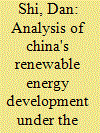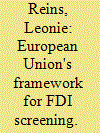| Srl | Item |
| 1 |
ID:
086616


|
|
|
|
|
| Publication |
2009.
|
| Summary/Abstract |
At present, the development of renewable energy relies mainly on government support. The government invests in a considerable number of projects to improve public welfare and to assist in poverty relief. If China is to replace fossil fuels on a large scale with renewable energy sources, the production costs and prices of renewable energy must be brought down. All countries are facing the challenge of moving to a more secure and low-carbon energy system without weakening economic and social development. In this regard, China is facing an even greater challenge in terms of economic cost, as cheap coal remains the main energy form. Technical innovation and industrialization in the area of renewable energy is an important means of lowering cost. China is in for a period of high-speed development of its economy and the rising demand for energy is irreversible. If the technical progress and development speed of renewable energy lags behind the growth in demand, it will be difficult to realize the improvement of its energy structure.
|
|
|
|
|
|
|
|
|
|
|
|
|
|
|
|
| 2 |
ID:
166439


|
|
|
|
|
| Summary/Abstract |
The European Commission recently released a proposal for a Regulation establishing a framework for screening of foreign investment into the European Union. The proposal aims at introducing a harmonized regulatory framework for the screening of foreign direct investments by Member States on grounds of security or public order, amongst others in the energy sector. The proposal seems to be catered towards deference for Member States, but considering the large amount of EU funding involved, as well as the applicability of EU legislation, in practice many projects will fall under the new screening competence of the Commission. Even though the Commission, according to the proposal, may only give an opinion, it appears to turn the energy competence ever more towards Brussels. This paper aims at determining how the screening mechanism should be seen in light of EU competences in the area of investment and energy. Is this an example of “mission creep” on the part of the Commission? Does this infringe Article 194 TFEU which guarantees the Member States' “right to determine the conditions for exploiting its energy resources, its choice between different energy sources and the general structure of its energy supply”? Or is this justified and needed action on the basis of the Article 170 TFEU on trans-European networks in the area of energy infrastructure?
|
|
|
|
|
|
|
|
|
|
|
|
|
|
|
|
| 3 |
ID:
092852


|
|
|
|
|
| Publication |
2009.
|
| Summary/Abstract |
Today's European energy policy is characterised by national approaches portraying it as one of the least successful areas of integration despite its importance for our everyday life. This exploratory study presents a new way in analysing the approaches and processes operative in this area. It introduces a new dimension of policy evaluation, the role of national energy majors, and proposes its utilisation in the increasingly important method of using indexes for energy supply security. By doing so, the relevance of perceptions of energy supply security for energy policy integration is highlighted, pointing at the concessions necessary to overcome the integratory deadlock. The indexes proposed in this paper can provide insights for policy-makers and researchers into the ongoing integration process and the crucial importance energy business plays therein. Finally, the exploratory methodology developed in this essay can be employed in various other policy areas to classify, discover and analyse policy directions.
|
|
|
|
|
|
|
|
|
|
|
|
|
|
|
|
| 4 |
ID:
125487


|
|
|
|
|
| Publication |
2013.
|
| Summary/Abstract |
Indonesia as an emerging country with one of the fastest growing economies requires sufficient supply with energy for national development. Domestic energy production cannot satisfy the domestic demand, and the deficiency necessitates growing imports. The present energy mix consists of 96% from non-renewable sources, i.e. fossil fuels, less than 4% from renewables. Government Regulation 5/2006 aims at increasing the proportion of renewable sources to 17%. Two scenarios for the energy situation in 2025 have been elaborated and are discussed. An overall energy policy strategy and regulatory framework covering non-renewable and renewable resources are crucial for securing energy demand.
|
|
|
|
|
|
|
|
|
|
|
|
|
|
|
|